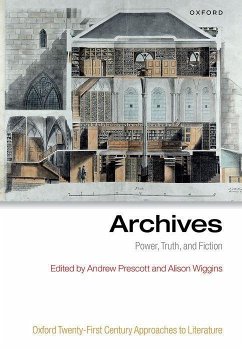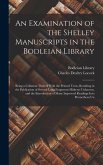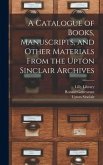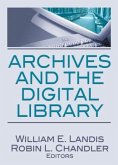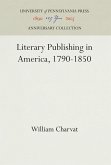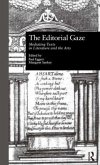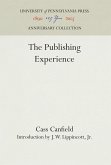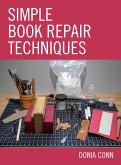- Gebundenes Buch
- Merkliste
- Auf die Merkliste
- Bewerten Bewerten
- Teilen
- Produkt teilen
- Produkterinnerung
- Produkterinnerung
Archives have never been more complex, expansive, or ubiquitous. Archives: Power, Truth, and Fiction is an indispensable research and reference book: a hugely helpful guide to archives in the twenty-first century. Material discussed ranges from medieval manuscripts to born-digital archival content, and art objects to state papers.
Andere Kunden interessierten sich auch für
![An Examination of the Shelley Manuscripts in the Bodleian Library An Examination of the Shelley Manuscripts in the Bodleian Library]() Charles Dealtry LocockAn Examination of the Shelley Manuscripts in the Bodleian Library33,99 €
Charles Dealtry LocockAn Examination of the Shelley Manuscripts in the Bodleian Library33,99 €![A Catalogue of Books, Manuscripts, and Other Materials From the Upton Sinclair Archives A Catalogue of Books, Manuscripts, and Other Materials From the Upton Sinclair Archives]() Ronald GottesmanA Catalogue of Books, Manuscripts, and Other Materials From the Upton Sinclair Archives32,99 €
Ronald GottesmanA Catalogue of Books, Manuscripts, and Other Materials From the Upton Sinclair Archives32,99 €![Archives and the Digital Library Archives and the Digital Library]() Archives and the Digital Library126,99 €
Archives and the Digital Library126,99 €![Literary Publishing in America, 1790-1850 Literary Publishing in America, 1790-1850]() William CharvatLiterary Publishing in America, 1790-1850100,99 €
William CharvatLiterary Publishing in America, 1790-1850100,99 €![The Editorial Gaze The Editorial Gaze]() Paul Eggert / Margaret Sankey (eds.)The Editorial Gaze128,99 €
Paul Eggert / Margaret Sankey (eds.)The Editorial Gaze128,99 €![The Publishing Experience The Publishing Experience]() Cass CanfieldThe Publishing Experience100,99 €
Cass CanfieldThe Publishing Experience100,99 €![Simple Book Repair Techniques Simple Book Repair Techniques]() Donia ConnSimple Book Repair Techniques144,99 €
Donia ConnSimple Book Repair Techniques144,99 €-
-
-
Archives have never been more complex, expansive, or ubiquitous. Archives: Power, Truth, and Fiction is an indispensable research and reference book: a hugely helpful guide to archives in the twenty-first century. Material discussed ranges from medieval manuscripts to born-digital archival content, and art objects to state papers.
Hinweis: Dieser Artikel kann nur an eine deutsche Lieferadresse ausgeliefert werden.
Hinweis: Dieser Artikel kann nur an eine deutsche Lieferadresse ausgeliefert werden.
Produktdetails
- Produktdetails
- Verlag: Oxford University Press
- Seitenzahl: 544
- Erscheinungstermin: 14. März 2024
- Englisch
- Abmessung: 239mm x 175mm x 58mm
- Gewicht: 1089g
- ISBN-13: 9780198829324
- ISBN-10: 0198829329
- Artikelnr.: 68505310
- Herstellerkennzeichnung
- Libri GmbH
- Europaallee 1
- 36244 Bad Hersfeld
- gpsr@libri.de
- Verlag: Oxford University Press
- Seitenzahl: 544
- Erscheinungstermin: 14. März 2024
- Englisch
- Abmessung: 239mm x 175mm x 58mm
- Gewicht: 1089g
- ISBN-13: 9780198829324
- ISBN-10: 0198829329
- Artikelnr.: 68505310
- Herstellerkennzeichnung
- Libri GmbH
- Europaallee 1
- 36244 Bad Hersfeld
- gpsr@libri.de
Andrew Prescott is Professor of Digital Humanities in the School of Critical Studies, University of Glasgow. He trained as a medieval historian and was a Curator in the Department of Manuscripts of the British Library between 1979 and 2000, where he was the principal curatorial contact for Kevin Kiernan's Electronic Beowulf. Professor Prescott was Theme Leader Fellow for the AHRC strategic theme of Digital Transformations 2012-2019. He has also worked in libraries, archives, and digital humanities units at the University of Sheffield, King's College London, and the University of Wales Lampeter. Alison Wiggins is Reader in English Language and Manuscripts in the School of Critical Studies, University of Glasgow. She has led and collaborated on a range of archive-based digital projects, at the AHRC Centre for Editing Lives and Letters between 2002 and 2006, and then at Glasgow as PI for The Letters of Bess of Hardwick (AHRC 2009-12), as Leadership Fellow for Archives and Writing Lives (AHRC 2017-19), and currently as part of the research team analyzing Adam Smith's Library (Templeton Foundation 2022-24). Dr Wiggins has also developed research and engagement projects with The National Trust, Chatsworth House Archives, The National Archives, The Bodleian Library, and the National Library of Scotland.
* List of Illustrations
* Abbreviations
* Acknowledgements
* Notes on Editorial Policy
* Notes on Contributors
* Foreword by Carolyn Steedman
* Introduction by Andrew Prescott and Alison Wiggins
* I. Conceptions
* 1: Michelle Caswell: 'The Archive' is Not An Archives: Acknowledging
the Intellectual Contribution of Archival Studies
* 2: Louise Craven: Where and What are the Boundaries of the Archive?
* 3: Hariz Halilovich and Anne J. Gilliland: Digitality and
Reconfiguring Global Archive(s) of Forced Migration
* 4: James Lowry: The Record as Command
* 5: Andrew Hoskins: New Memory and The Archive
* 6: Niamh Moore: Response to Conceptions
* II. Frameworks
* 7: Andrew Prescott: Appraisal and Original Order: The Power
Structures of the Archive
* 8: Anna Sexton: Archival Education and Professionalism
* 9: Lisa Gitelman: Metadata
* 10: Ruth Ahnert and Sebastian E. Ahnert: Networks
* 11: Michael Moss and David Thomas: Authenticating and Evaluating
Evidence
* 12: Victoria Van Hyning and Heather Wolfe: More Content, Less
Context: Rethinking Access
* 13: Janet Foster: Response to Frameworks
* III. Materialities
* 14: Alison Wiggins: The Materiality of Written Textual Forms
* 15: Simon Popple: Sound and Vision: The Audio-Visual Archive
* 16: Catherine Richardson: Doors Into the Archives: Material Objects
and Document Collections
* 17: Jane Birkin: Archives, Art, and the Performativity of Practice
* 18: Eirini Goudarouli: Digital Innovation and Archival Thinking
* 19: Laura Mandell: Response to Materialities
* IV. Encounters and Evolution
* 20: Eric Ketelaar: The Agency of Archivers
* 21: Paul Lihoma: State Power and the Shaping of Archives in Malawi
* 22: Paul Strohm: Archival Impulses and the Gunpowder Plot
* 23: Nadine Akkerman and Pete Langman: Accidentally on Purpose:
Denying Any Responsibility for the Accidental Archive
* 24: Julie A. Fisher: Response to Encounters and Evolution
* V. Narrators
* 25: Karina Beras and Jarrett Martin Drake: From Repositories of
Failure to Archives of Abolition
* 26: Rachel Douglas: Writer-Editors Making the Haitian and Caribbean
Archives Talk
* 27: Sylvia Federico: Finding Women in the Archives of 1381
* 28: Norma Clarke: On Family History and Archives
* 29: Ruth Maclennan: An Artist Unpacks the Archives
* 30: Alan Stewart: Response to Narrators
* VI. Erasures and Exclusion
* 31: Lae'l Hughes-Watkins: America's Scrapbook: A Reckoning in the
Archives
* 32: Rebecca Kahn: Irreconcilable Archives: Queer Collections and the
Truth and Reconciliation Commission
* 33: Rebecca Abby Whiting: Destruction and Displacement: The 2003 War
and the Struggle for Iraq's Records
* 34: Edwina Ashie-Nikoi, Emmanuel Adjei, and Musah Adams: Of Bonfires,
Mindsets, and Policies: The Multi-Causal Matrix of Silence in
Ghanaian Public Archives
* 35: Kirsten Weld: Response to Erasures and Exclusion
* Afterword by Verne Harris
* Index
* Abbreviations
* Acknowledgements
* Notes on Editorial Policy
* Notes on Contributors
* Foreword by Carolyn Steedman
* Introduction by Andrew Prescott and Alison Wiggins
* I. Conceptions
* 1: Michelle Caswell: 'The Archive' is Not An Archives: Acknowledging
the Intellectual Contribution of Archival Studies
* 2: Louise Craven: Where and What are the Boundaries of the Archive?
* 3: Hariz Halilovich and Anne J. Gilliland: Digitality and
Reconfiguring Global Archive(s) of Forced Migration
* 4: James Lowry: The Record as Command
* 5: Andrew Hoskins: New Memory and The Archive
* 6: Niamh Moore: Response to Conceptions
* II. Frameworks
* 7: Andrew Prescott: Appraisal and Original Order: The Power
Structures of the Archive
* 8: Anna Sexton: Archival Education and Professionalism
* 9: Lisa Gitelman: Metadata
* 10: Ruth Ahnert and Sebastian E. Ahnert: Networks
* 11: Michael Moss and David Thomas: Authenticating and Evaluating
Evidence
* 12: Victoria Van Hyning and Heather Wolfe: More Content, Less
Context: Rethinking Access
* 13: Janet Foster: Response to Frameworks
* III. Materialities
* 14: Alison Wiggins: The Materiality of Written Textual Forms
* 15: Simon Popple: Sound and Vision: The Audio-Visual Archive
* 16: Catherine Richardson: Doors Into the Archives: Material Objects
and Document Collections
* 17: Jane Birkin: Archives, Art, and the Performativity of Practice
* 18: Eirini Goudarouli: Digital Innovation and Archival Thinking
* 19: Laura Mandell: Response to Materialities
* IV. Encounters and Evolution
* 20: Eric Ketelaar: The Agency of Archivers
* 21: Paul Lihoma: State Power and the Shaping of Archives in Malawi
* 22: Paul Strohm: Archival Impulses and the Gunpowder Plot
* 23: Nadine Akkerman and Pete Langman: Accidentally on Purpose:
Denying Any Responsibility for the Accidental Archive
* 24: Julie A. Fisher: Response to Encounters and Evolution
* V. Narrators
* 25: Karina Beras and Jarrett Martin Drake: From Repositories of
Failure to Archives of Abolition
* 26: Rachel Douglas: Writer-Editors Making the Haitian and Caribbean
Archives Talk
* 27: Sylvia Federico: Finding Women in the Archives of 1381
* 28: Norma Clarke: On Family History and Archives
* 29: Ruth Maclennan: An Artist Unpacks the Archives
* 30: Alan Stewart: Response to Narrators
* VI. Erasures and Exclusion
* 31: Lae'l Hughes-Watkins: America's Scrapbook: A Reckoning in the
Archives
* 32: Rebecca Kahn: Irreconcilable Archives: Queer Collections and the
Truth and Reconciliation Commission
* 33: Rebecca Abby Whiting: Destruction and Displacement: The 2003 War
and the Struggle for Iraq's Records
* 34: Edwina Ashie-Nikoi, Emmanuel Adjei, and Musah Adams: Of Bonfires,
Mindsets, and Policies: The Multi-Causal Matrix of Silence in
Ghanaian Public Archives
* 35: Kirsten Weld: Response to Erasures and Exclusion
* Afterword by Verne Harris
* Index
* List of Illustrations
* Abbreviations
* Acknowledgements
* Notes on Editorial Policy
* Notes on Contributors
* Foreword by Carolyn Steedman
* Introduction by Andrew Prescott and Alison Wiggins
* I. Conceptions
* 1: Michelle Caswell: 'The Archive' is Not An Archives: Acknowledging
the Intellectual Contribution of Archival Studies
* 2: Louise Craven: Where and What are the Boundaries of the Archive?
* 3: Hariz Halilovich and Anne J. Gilliland: Digitality and
Reconfiguring Global Archive(s) of Forced Migration
* 4: James Lowry: The Record as Command
* 5: Andrew Hoskins: New Memory and The Archive
* 6: Niamh Moore: Response to Conceptions
* II. Frameworks
* 7: Andrew Prescott: Appraisal and Original Order: The Power
Structures of the Archive
* 8: Anna Sexton: Archival Education and Professionalism
* 9: Lisa Gitelman: Metadata
* 10: Ruth Ahnert and Sebastian E. Ahnert: Networks
* 11: Michael Moss and David Thomas: Authenticating and Evaluating
Evidence
* 12: Victoria Van Hyning and Heather Wolfe: More Content, Less
Context: Rethinking Access
* 13: Janet Foster: Response to Frameworks
* III. Materialities
* 14: Alison Wiggins: The Materiality of Written Textual Forms
* 15: Simon Popple: Sound and Vision: The Audio-Visual Archive
* 16: Catherine Richardson: Doors Into the Archives: Material Objects
and Document Collections
* 17: Jane Birkin: Archives, Art, and the Performativity of Practice
* 18: Eirini Goudarouli: Digital Innovation and Archival Thinking
* 19: Laura Mandell: Response to Materialities
* IV. Encounters and Evolution
* 20: Eric Ketelaar: The Agency of Archivers
* 21: Paul Lihoma: State Power and the Shaping of Archives in Malawi
* 22: Paul Strohm: Archival Impulses and the Gunpowder Plot
* 23: Nadine Akkerman and Pete Langman: Accidentally on Purpose:
Denying Any Responsibility for the Accidental Archive
* 24: Julie A. Fisher: Response to Encounters and Evolution
* V. Narrators
* 25: Karina Beras and Jarrett Martin Drake: From Repositories of
Failure to Archives of Abolition
* 26: Rachel Douglas: Writer-Editors Making the Haitian and Caribbean
Archives Talk
* 27: Sylvia Federico: Finding Women in the Archives of 1381
* 28: Norma Clarke: On Family History and Archives
* 29: Ruth Maclennan: An Artist Unpacks the Archives
* 30: Alan Stewart: Response to Narrators
* VI. Erasures and Exclusion
* 31: Lae'l Hughes-Watkins: America's Scrapbook: A Reckoning in the
Archives
* 32: Rebecca Kahn: Irreconcilable Archives: Queer Collections and the
Truth and Reconciliation Commission
* 33: Rebecca Abby Whiting: Destruction and Displacement: The 2003 War
and the Struggle for Iraq's Records
* 34: Edwina Ashie-Nikoi, Emmanuel Adjei, and Musah Adams: Of Bonfires,
Mindsets, and Policies: The Multi-Causal Matrix of Silence in
Ghanaian Public Archives
* 35: Kirsten Weld: Response to Erasures and Exclusion
* Afterword by Verne Harris
* Index
* Abbreviations
* Acknowledgements
* Notes on Editorial Policy
* Notes on Contributors
* Foreword by Carolyn Steedman
* Introduction by Andrew Prescott and Alison Wiggins
* I. Conceptions
* 1: Michelle Caswell: 'The Archive' is Not An Archives: Acknowledging
the Intellectual Contribution of Archival Studies
* 2: Louise Craven: Where and What are the Boundaries of the Archive?
* 3: Hariz Halilovich and Anne J. Gilliland: Digitality and
Reconfiguring Global Archive(s) of Forced Migration
* 4: James Lowry: The Record as Command
* 5: Andrew Hoskins: New Memory and The Archive
* 6: Niamh Moore: Response to Conceptions
* II. Frameworks
* 7: Andrew Prescott: Appraisal and Original Order: The Power
Structures of the Archive
* 8: Anna Sexton: Archival Education and Professionalism
* 9: Lisa Gitelman: Metadata
* 10: Ruth Ahnert and Sebastian E. Ahnert: Networks
* 11: Michael Moss and David Thomas: Authenticating and Evaluating
Evidence
* 12: Victoria Van Hyning and Heather Wolfe: More Content, Less
Context: Rethinking Access
* 13: Janet Foster: Response to Frameworks
* III. Materialities
* 14: Alison Wiggins: The Materiality of Written Textual Forms
* 15: Simon Popple: Sound and Vision: The Audio-Visual Archive
* 16: Catherine Richardson: Doors Into the Archives: Material Objects
and Document Collections
* 17: Jane Birkin: Archives, Art, and the Performativity of Practice
* 18: Eirini Goudarouli: Digital Innovation and Archival Thinking
* 19: Laura Mandell: Response to Materialities
* IV. Encounters and Evolution
* 20: Eric Ketelaar: The Agency of Archivers
* 21: Paul Lihoma: State Power and the Shaping of Archives in Malawi
* 22: Paul Strohm: Archival Impulses and the Gunpowder Plot
* 23: Nadine Akkerman and Pete Langman: Accidentally on Purpose:
Denying Any Responsibility for the Accidental Archive
* 24: Julie A. Fisher: Response to Encounters and Evolution
* V. Narrators
* 25: Karina Beras and Jarrett Martin Drake: From Repositories of
Failure to Archives of Abolition
* 26: Rachel Douglas: Writer-Editors Making the Haitian and Caribbean
Archives Talk
* 27: Sylvia Federico: Finding Women in the Archives of 1381
* 28: Norma Clarke: On Family History and Archives
* 29: Ruth Maclennan: An Artist Unpacks the Archives
* 30: Alan Stewart: Response to Narrators
* VI. Erasures and Exclusion
* 31: Lae'l Hughes-Watkins: America's Scrapbook: A Reckoning in the
Archives
* 32: Rebecca Kahn: Irreconcilable Archives: Queer Collections and the
Truth and Reconciliation Commission
* 33: Rebecca Abby Whiting: Destruction and Displacement: The 2003 War
and the Struggle for Iraq's Records
* 34: Edwina Ashie-Nikoi, Emmanuel Adjei, and Musah Adams: Of Bonfires,
Mindsets, and Policies: The Multi-Causal Matrix of Silence in
Ghanaian Public Archives
* 35: Kirsten Weld: Response to Erasures and Exclusion
* Afterword by Verne Harris
* Index

